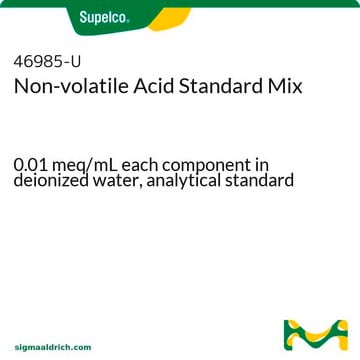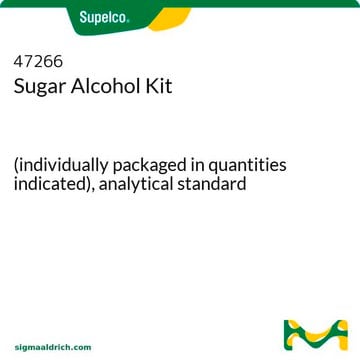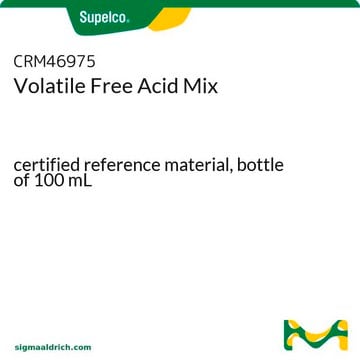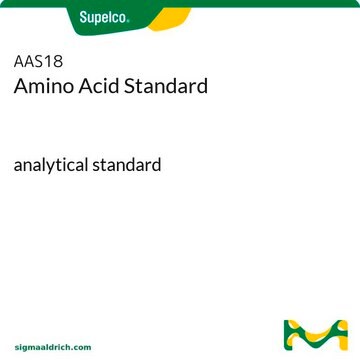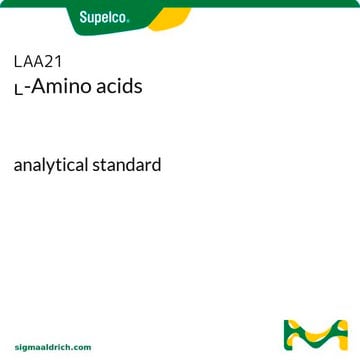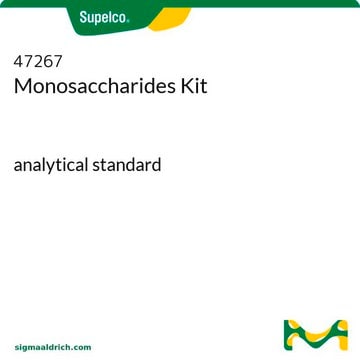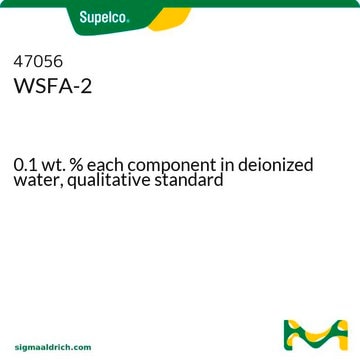47264
Organic Acids Kit
(individually packaged), analytical standard
Sign Into View Organizational & Contract Pricing
All Photos(1)
About This Item
UNSPSC Code:
12164500
Recommended Products
grade
analytical standard
CofA
current certificate can be downloaded
packaging
pkg of 1 kit
concentration
(individually packaged)
technique(s)
HPLC: suitable
gas chromatography (GC): suitable
application(s)
cleaning products
cosmetics
food and beverages
personal care
format
neat
storage temp.
-10 to -25°C
General description
Organic Acids Kit contains individually packaged acid standards in the quantities listed. The organic acids are prepared, tested, and individually packaged using rigorous manufacturing procedures.
Application
Refer to the product′s Certificate of Analysis for more information on a suitable instrument technique. Contact Technical Service for further support.
Kit Components Only
Product No.
Description
- Acetic acid 500 mg
- Adipic acid 500 mg
- L-Ascorbic acid 500 mg
- Benzoic acid 500 mg
- Butyric acid 500 mg
- Citric acid 500 mg
- Isobutyric acid 500 mg
- Formic acid 500 mg
- Fumaric acid 500 mg
- L-(+)-Lactic acid 100 mg
- DL-Isocitric acid trisodium salt hydrate 100 mg
- Maleic acid 500 mg
- Malonic acid 500 mg
- D-(+)-Malic acid 100 mg
- Oxalic acid 500 mg
- Phytic acid 500 mg
- Propionic acid 500 mg
- (-)Quinic acid 500 mg
- Succinic acid 500 mg
- Shikimic acid 100 mg
- D-(−)-Tartaric acid 500 mg
See All (21)
related product
Product No.
Description
Pricing
Signal Word
Danger
Hazard Statements
Precautionary Statements
Hazard Classifications
Acute Tox. 3 Dermal - Acute Tox. 3 Inhalation - Acute Tox. 4 Oral - Eye Dam. 1 - Flam. Liq. 3 - Skin Corr. 1 - Skin Sens. 1 - STOT RE 1 Inhalation - STOT SE 3
Target Organs
Lungs, Respiratory system
Supplementary Hazards
Storage Class Code
3 - Flammable liquids
Flash Point(F)
104.0 °F
Flash Point(C)
40 °C
Choose from one of the most recent versions:
Already Own This Product?
Find documentation for the products that you have recently purchased in the Document Library.
Customers Also Viewed
Hector Herrera et al.
Microorganisms, 7(12) (2019-11-24)
The microbiological interactions of the roots of non-photosynthetic plants in South America have been scarcely explored. This study analyzes culturable fungal diversity associated with the mycoheterotrophic plant Arachnitis uniflora Phil. (Corsiaceae) in southern Chile, growing in two different understoreys of
Beatriz E Valdés-Duque et al.
Journal of the American College of Nutrition, 39(8), 706-712 (2020-03-13)
Objective: To determine the concentration of stool short-chain fatty acids (SCFAs) in critically ill patients with sepsis and to compare the results between the critically ill patient and the control group.Methods: This descriptive, multicenter, observational study was conducted in five
Gordana Zavisic et al.
Brazilian journal of microbiology : [publication of the Brazilian Society for Microbiology], 43(1), 418-428 (2012-01-01)
In this study, we checked lactobacilli strains of human origin for their potential as probiotic. Samples were collected from oral mucosa of 16 healthy individuals, out of which twenty isolates were obtained and two of them were selected and identified
Philippe Jourand et al.
Tree physiology, 30(10), 1311-1319 (2010-08-07)
Ectomycorrhizal (ECM) Pisolithus albus (Cooke & Massee), belonging to the ultramafic ecotype isolated in nickel-rich serpentine soils from New Caledonia (a tropical hotspot of biodiversity) and showing in vitro adaptive nickel tolerance, were inoculated to Eucalyptus globulus Labill used as
Jacobo de la Cuesta-Zuluaga et al.
Nutrients, 11(1) (2018-12-29)
Fiber fermentation by gut microbiota yields short-chain fatty acids (SCFAs) that are either absorbed by the gut or excreted in feces. Studies are conflicting as to whether SCFAs are beneficial or detrimental to cardiometabolic health, and how gut microbiota associated
Our team of scientists has experience in all areas of research including Life Science, Material Science, Chemical Synthesis, Chromatography, Analytical and many others.
Contact Technical Service
